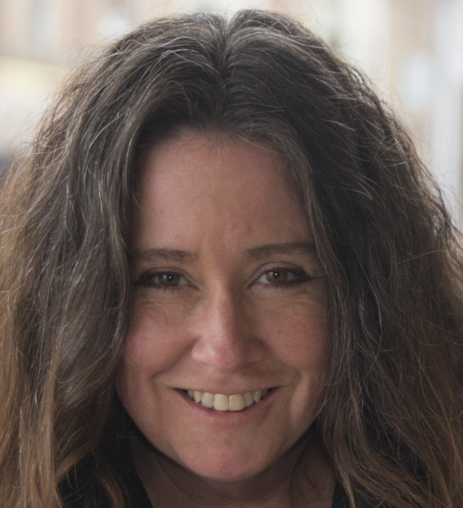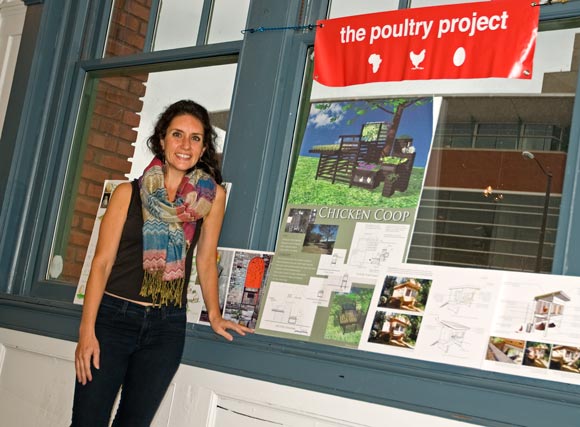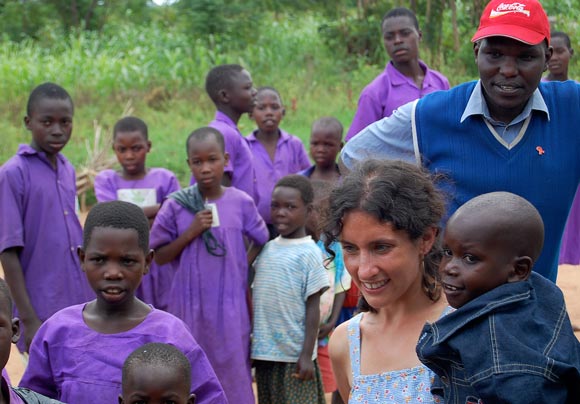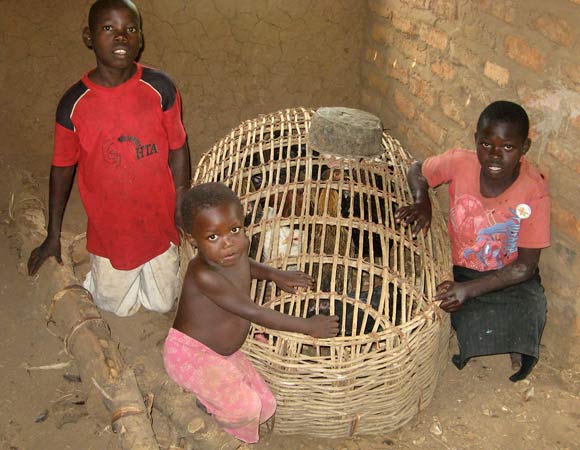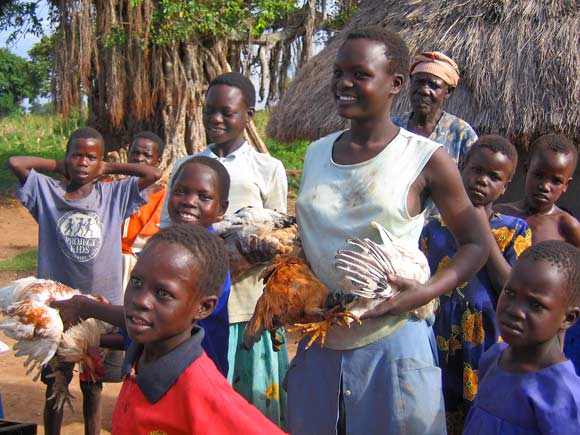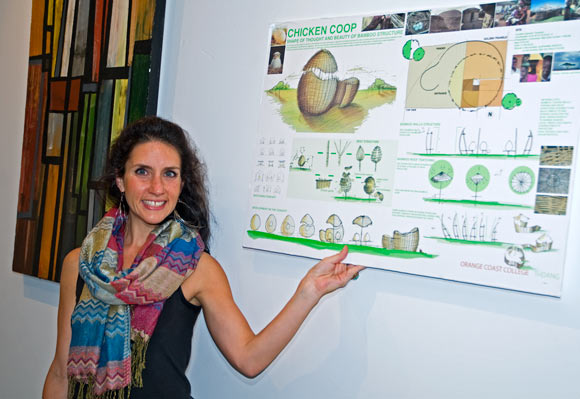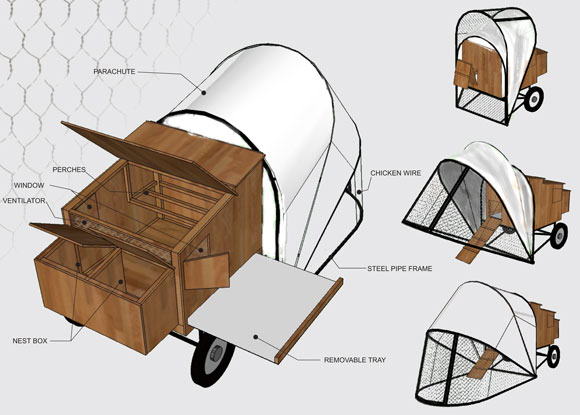hope from feathers: poultry project helps families one chicken at a time
By forging her own path to sub-Saharan Africa, Lakewood resident Kelly Flamos unwittingly co-founded the Poultry Project, which empowers AIDS-affected children through the gift of live chickens.
It all began at the AIDS Taskforce of Greater Cleveland, explains Flamos, where she interned as part of her graduate studies in social work at Case Western Reserve University.
"We were talking about AIDS in Africa," she says, recalling how she first learned of The AIDS Support Organization (TASO). "I wanted to go there and intern." But Case had no affiliate programs in place -- so Flamos set out on her own. She raised the necessary funding and made her first trip to Mbale, Uganda, in June 2006.
Flamos saw babies sleeping beneath leaking roofs constructed of leaves. She met a teen boy suffering from an infected abscess on his leg. And she encountered a grandmother who lost her son to AIDS and found herself caring for his 11 orphaned children. Flamos detailed all of these experiences in a blog with such humanity, vulnerability and hope that she manages to put our own mundane stateside melodramas into keen perspective.
After less than a month in Uganda, Flamos very much wanted to find a way to give AIDS orphans the means to generate sustainable income. Robert Oluka, a TASO counselor, had a suggestion.
"He said that we should give them chickens," Flamos recalls. "A chicken can turn into a goat and a goat can turn into a cow."
Thus, the Poultry Project was born. Flamos and another American student, Julian Harris, pooled their hardscrabble funding. "I had about $600," says Flamos. "Julian had some money, and his dad pledged some money."
With the help of TASO, the Poultry Project selected 21 families and outfitted them with everything they'd need to establish a fledgling poultry farm: four hens, a rooster, a bicycle, supplies, some feed, and training.
And just as her counselor had predicted, Flamos watched as some families slowly, steadily increased their livestock holdings. She recounts one quietly triumphant story of a single mother and her 10-year-old son, both HIV positive, who managed to scrape together the necessary funds to purchase land and a cow -- all with proceeds earned from selling chicks and eggs.
In 2008 the Poultry Project added six families and, just weeks ago, obtained its official nonprofit status.
"It's a stamp of legitimacy," says Flamos of the 501(c)3 designation, which clears the way for grant applications and tax-deductible donations. With an estimated 250 family candidates for participation in Mbale alone, there's plenty of need surrounding this laudable project, which gets underway for as little as $100 per family.
Every gentle success for Flamos and her team has been hard won. In 2007, many of the chickens died of a common illness. Flamos replaced the birds with money originally slated for new Poultry Project families. And then there is the other dreadful statistic: Five children from the initial 2006 group of Poultry Project families have died.
Such stark realities only serve to hasten the beating heart of the Poultry Project. In an attempt to expose the work to a larger audience -- and to tether farflung work in Uganda with hometown Cleveland -- Flamos and her team organized a global Chicken Coop Design Competition, which garnered over 60 entries from around the world.
"It was a fun way to promote the Poultry Project," says Flamos.
Entries were required to accommodate up to six birds while being suitable for both urban and suburban settings. Over Thanksgiving weekend Cleveland's Wooltex Gallery hosted a free exhibition of all the entries. Attendees learned that adding a dash of design to typically utilitarian chicken roosts can produce very inspired results.
One such entry, titled "The Zephyr," rivaled Nike's famous swoosh, whereas the "Chicken Sedan" had poultry panache. The "Poule Belle," from Paris, utilized Ikea kitchen cabinets while the "Eclecticoop" was designed to fit an apartment balcony. And what chicken wouldn't plump her feathers to live in the aptly named "Cirque de Poulet"?
Vocon, a Cleveland-based architecture and design firm that has done work for the Browns, Cavs and Indians, filed an entry that converts old tires into chicken-nesting vessels. Vocon's Chris Rood worked on the project.
"It's obviously very different from what we normally do," Rood admits, "but it was a lot of fun because... it's a chicken coop."
The Coop Competition jury included professionals in the areas of design, agriculture and urban planning. The winning entry, the Portable Chicken Coop, earned $500 for a team from the University of Karachi in Pakistan. The $250 People's Choice award went to the funky "Cart Coop," which transformed a shopping cart into an urban chicken crib.
The goal, of course, is to export successful ideas back to Uganda. "We'll brainstorm and see which ones will work best," says Flamos, who was so inspired by the response to the competition that she hopes to make it an annual event and fundraiser.
"The point of the competition was to have people come up with a design for a coop that combines utility with aesthetics and draws attention to the Poultry Project indirectly -- like a bridge between our experience in Cleveland and our experience in Uganda," she says.
Flamos also envisions the competition as a springboard to more proximate horizons. After all, a chicken is a chicken, be it in Uganda or Euclid.
"I would love to do the Poultry Project for adults living with HIV in Cleveland," says Flamos. "It wouldn't give somebody a huge income, but it can be a wonderful experience, like growing your own vegetables."
"Good design," she knows, "can change lives."
* Want to help by donating a chicken to a needy family? Click here.
